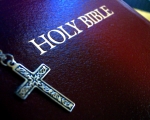 There’s no doubt that the bible has had a significant impact on human history. The bible has inspired artists such as Michelangelo and Botticelli, composers like Bach and Vivaldi, and even authors like C.S. Lewis. Although not strictly Christian concepts, we have the bible to thank for the popularity of Santa Claus and the Easter Bunny. Of course, we also have the bible and related works to thank for the atrocities of the crusades, the Middle East conflicts and even, yes, the holocaust. But should the bible be something taught in schools or is it best left for parents and priests to discuss? One California school district thinks the bible’s influence is substantial enough to warrant teaching about it.
There’s no doubt that the bible has had a significant impact on human history. The bible has inspired artists such as Michelangelo and Botticelli, composers like Bach and Vivaldi, and even authors like C.S. Lewis. Although not strictly Christian concepts, we have the bible to thank for the popularity of Santa Claus and the Easter Bunny. Of course, we also have the bible and related works to thank for the atrocities of the crusades, the Middle East conflicts and even, yes, the holocaust. But should the bible be something taught in schools or is it best left for parents and priests to discuss? One California school district thinks the bible’s influence is substantial enough to warrant teaching about it.
Of course, the key to the course is the word “about” — public schools cannot teach the bible as literal (or even symbolic) truth; to do so would be to infringe upon the students’ right to select their own beliefs without government advocacy of any particular set of beliefs. All a public school can legally and constitutionally do is to teach about the bible — its impact and influence, positive and negative.
So the Chino Valley School District, near Los Angeles, has decided to offer high school seniors an elective class on the “Bible as/in Literature and History.” Of course, in all fairness (and so as not to show favoritism toward one religion), the district should also offer classes on the Qur’an, The Book of Mormon, the Bhagavad Gita, the ancient Egyptian Book of the Dead, and, naturally, The Gospel of the Flying Spaghetti Monster. Even if they don’t cover the myriad other holy books, surely the biblical course will avoid any sort of proselytizing, won’t it?
When the president of the Board of Education makes statements such as “It is my belief that better understanding the Bible will help all students with their decision-making process” and then adds that “the Bible has been a part of my life ever since I could remember. It has had a very positive influence on me and my family,” I’m not so sure the course will remain neutral. One could argue that, since the class came about in response to parents asking for the bible to be taught in school, it’s likely that the only kids taking the optional class will be those whose parents are already believers and, therefore, isn’t really a problem.
Perhaps not, for those kids, but what about those who are excluded for not being a part of the special class? What about those who are paying for religious education that they don’t believe in? While I’m sure a class in biblical impact and influence would be interesting and worthwhile, I must admit I doubt the both the intent and the ability to separate faith from facts. What do you think? Can a high school bible course avoid theology?
Tags: bible, church and state, culture, Education, first amendment, high school, koran, public schools, quran, religion, schools, theology


Yes, a HS class absolutely can teach a class of Bible as Literature, or the Bible in History, and retain its neutrality. However, the real question is whether or not the teacher is willing to separate his or her own beliefs (regardless of their stance on the issue) in order to teach neutrally on the subject. Also, that teacher must be able to allow each student (that has a constitutional right to express their beliefs and stance on the issue) their own view without critisism that reflects on the student’s grade. The real issue rests on the teacher’s ability and willingness to remain neutral.